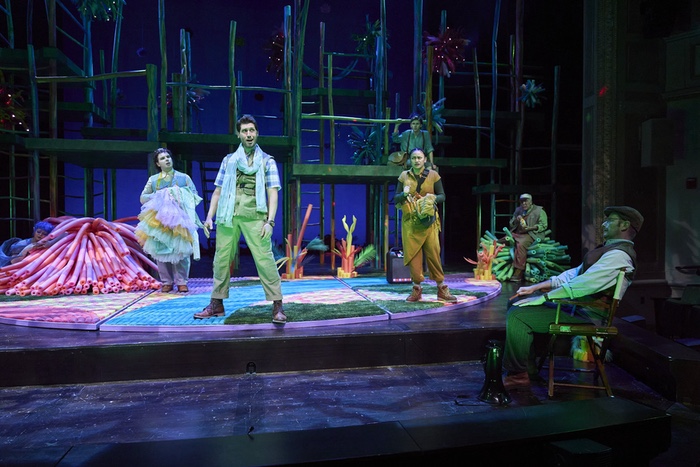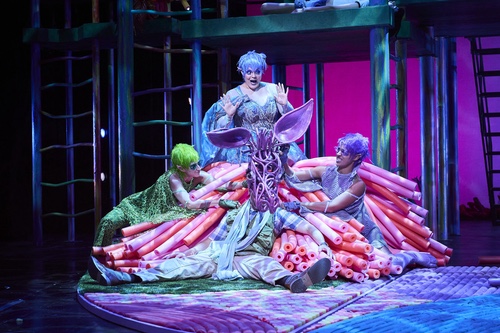
William Shakespeare is considered by many to be the greatest Western playwright of all times. In spite of this, many are reluctant to see a production of his plays. Why the hesitancy? It is perceived that language he used, the format of the speeches, and the material he writes about is too abstract or complicated to just “sit back, enjoy and understand.”
Play On Shakespeare (POS) is a nonprofit company promoting and creating contemporary modern translations of Shakespeare’s plays. Scripts are easily understood, using modern language. A Midsummer Night’s Dream, their partnership with Great Lakes Theater, is now on stage at the Hanna Theatre.
“Since its inception in 2015, Play On Shakespeare has commissioned dozens of contemporary playwrights to translate 39 Shakespeare plays into modern English.” Each playwright is “tasked with matching Shakespeare’s linguistic rigor as they approached the text, preserving rhyme, rhythm, metaphor, meter, imagery, symbolism, rhetoric, and the structure that make Shakespeare’s plays engaging and accessible to today’s audience.”
In the case of GLT presenting one of the Bard’s most delightful works, director Sara Bruner not only used the newly conceived words, but has added her special touches of extreme farce and exaggeration to make the experience audience involving and entertaining.
The escapist comedy centers on the goings-on after Duke Theseus, who has the power to approve all marriages, rejects the matrimonial prospects of two sets of young Athenians. The foursome flee into the forest and run headlong into problems that they didn’t anticipate. Much of the chaos centers on the mischievous Puck, who attempts to “help” Oberon, King of the Fairies, who is having marriage problems, as well as the Athenians.
The script’s translator Jeffrey Whitty (author of the book for the Tony winning musical Avenue Q) hopes “that my translation will lift audience spirits as a supplement to Shakespeare’s indelible original. While the language is sometimes mine, the architecture is all Shakespeare, as fresh as anything on the boards these days.”

It must be recognized that Whitty has wiped out much of the Bard’s beautiful language and structure in his attempt to win over modern-day viewers. Shakespeare lovers will have problems with this approach. Bardisms such as “Love looks not with the eyes, but with the mind, And therefore is winged Cupid painted blind” get short shift in this version. So does Puck’s “Now to ’scape the serpent’s tongue, We will make amends ere long; Else the Puck a liar call, So, good night unto you all.” This is the type of language that has made Shakespeare a legend.
No matter the language: because this is a comedy, thus insuring a happily-ever-after ending, each of the couples unites in harmony.
Once the audience settled in and realized that this was not the Bard they were used to, the GLT production was met with prolonged bouts of laughing and clapping.
The key to what was to come was revealed on the open-curtain stage set at the start of the play. The view was of lots of vertical and horizontal multi-colored Eucalyptus tree platforms and shafts adorned with flowers and plants constructed of equally colorful pool noodles.
Set designer Courtney O’Neill had created a visual illusion of a drug-induced illusion of “into the woods.” Mieka van der Ploeg’s costumes continued the visual assault with nondescript multi-colored costumes, which were illuminated by Trad A Burn’s creative lighting. Yep, this was not going to be, nor was, traditional Shakespeare!
The cast, who clearly understood the concept of “farce,” performed all the schticks, asides, slapstick and exaggerations of director Bruner’s imagination.
Joe Wegner was properly puckish in carrying out his devilishly delightful deeds, Nick Steen appealingly brayed his way through his transformation from Bottom, a weaver, to a purple-headed ass, and the youths all well-created exaggerated youthful lovers.

CAPSULE JUDGMENT: GLT’s A Midsummer Night’s Dream will delight those who enjoy unbridled farce and modern language, while Shakespeare purists will rue the day they saw this “reimagined,” Bard-light edition. Me? I started out on the side of the purists and ended up an advocate of the modernists. Go…see…enjoy (maybe!).